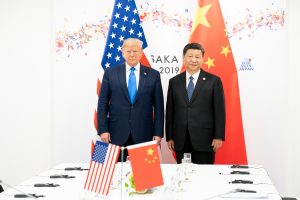I would have normally prefaced a piece on muscular foreign policy pronouncements from a lame duck administration days away from stepping down with the famous Dylan Thomas lines – “Do not go gentle into the good night… Rage, rage against the dying of the light” – had said administration not been U.S. President Donald Trump’s. Even as Trump himself bends every known political norm known in the United States to the breaking point to hold on to power, despite unambiguous defeat in the November elections, his policy team continues to tilt at Chinese windmills.
The latest installment in the sad saga that is the Trump administration’s China policy near its end – recently described as a “driverless clown car careening into a ditch” by the Sinocism newsletter writer Bill Bishop – is a January 4 Newsweek op-ed co-authored by Secretary of State Mike Pompeo and Marshall Billingslea, the special presidential envoy for arms control. The piece is titled, with characteristic moderation, “China’s Nuclear Madness.” (Other similar recent hits include a China strategy document released in November, again with due consideration to not overstating one’s case, titled “The Elements of the China Challenge.” Commenting on the document’ authors – the State Department’s Policy Planning Staff – in Foreign Policy, Carnegie Endowment for International Peace senior fellow and former U.S. diplomat Daniel Baer wrote “From the outset, a reader is wont to marvel at their apparent lack of a sense of irony.”)
The Pompeo-Billingslea piece rehashes familiar themes so often repeated that you can almost hear the reader yawning. “Over the past four years, the Trump administration has awakened the world to the China challenge. Beijing’s two-decades-long asymmetric arms race is a core part of that challenge. It endangers the American homeland, our strategic positions in the Indo-Pacific, and our allies and partners,” they write at one point.
But that probably is a little unfair; there are surprising nuggets in the piece. After all, the two State Department worthies do write “Beijing refuses to disclose how many nuclear weapons it has, how many it plans to develop, or what it plans to do with them,” leading one to wonder whether many other nuclear powers have been publishing statements all along that tell you how many weapons they have or how many they are in the process of making or whether they plan on using them and how.
Of course, there is no denying that China is modernizing its nuclear capabilities. It is securing its second-strike capabilities, including focusing on newer SSBN capabilities as well as road-mobile launchers, not to mention novel delivery capabilities such as hypersonics, or focusing on MIRVs. (Both, as nuclear strategist Vipin Narang explained in an interview to The Diplomat, stem from persistent U.S. obsession with ballistic missile defense systems and counterforce strategies.) But equally true is the fact that there are persistent myths about China’s nuclear program that, because of the very fact that they hype it up, detracts from real risks.
The Trump administration’s absurd program to push back against Chinese nuclear capabilities has included a strange, on again/off again, plan to make Beijing party to negotiations around the renewal of the New START scheduled to expire on February 5, something the Pompeo-Billingslea op-ed repitches. (Russia, in a characteristic display of wiliness, has used the election-related pandemonium in the United States to hold off any deal around the treaty’s extension as long as Trump is in the White House.)
While New START is basically in both the United States’ and Russia’s interest – arms control agreements are rarely acts of altruism, but materialize when both sides see concrete gains from them – by attempting to drag China in into the renewal negotiations, the Trump administration introduced a needless complication. There are no rational reasons why Beijing – with a nuclear arsenal a small fraction of the other two parties’ – would agree to it. Strangely, the Pompeo-Billingslea op-ed notes: “We’ve briefed allies, partners and even the highest levels of the Russian government on China’s nuclear buildup” – as if that would have pushed Moscow to bring close ally China into the New START fold.
But many of these issues are already known, surely to Trump’s policy team. So, this begs the question: why the op-ed, especially now? Part of it has to do with something Trump has in common with many other contemporary authoritarian populists around the world: an accent on state policy as theater. Trump and his cabinet members have rarely cared if their policy statements made any difference on the ground, as long as they emerged sounding like tough guys.
The fact of the matter is that after four years of bombastic statements laden with threats, China remains exactly where it was when Trump took over in January 2017. Its military modernization plans continue apace, it continues to bully close allies, and large swathes of the Asia-Pacific (even countries that have very good reasons to worry about Chinese intransigence) remain fundamentally unconvinced of Trump’s approach towards China. The recent conclusion of talks on the China-European Union investment treaty demonstrates that the Trump administration’s grand plans of complete economic decoupling from China has had little purchase elsewhere, even inside the incoming Biden administration.
Early on in Trump’s term, policy thinkers in his administration described his foreign policy as “principled realism.” Assuming reasonably that realism has something to do with extant reality and principles are more than mere bombast, that description has aged rather badly.
































